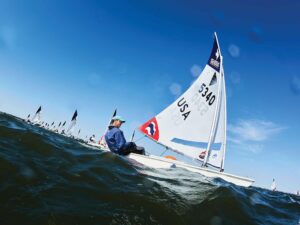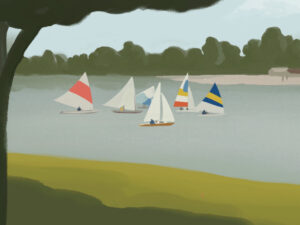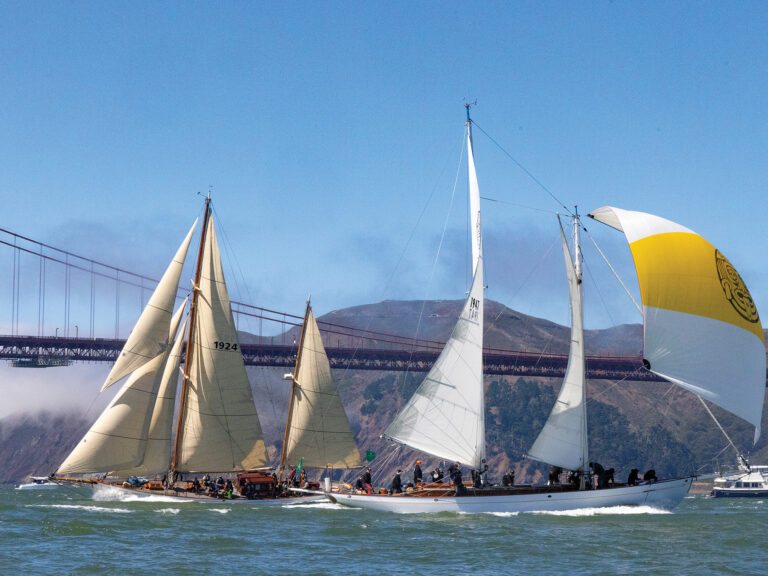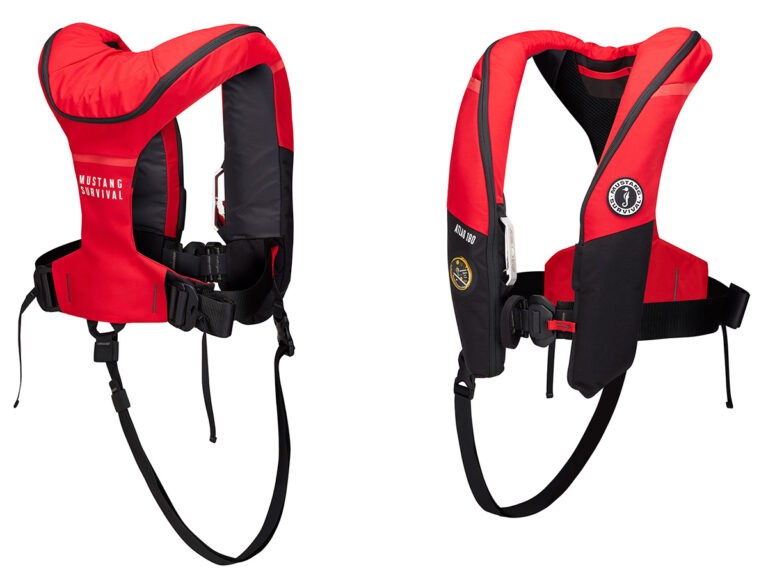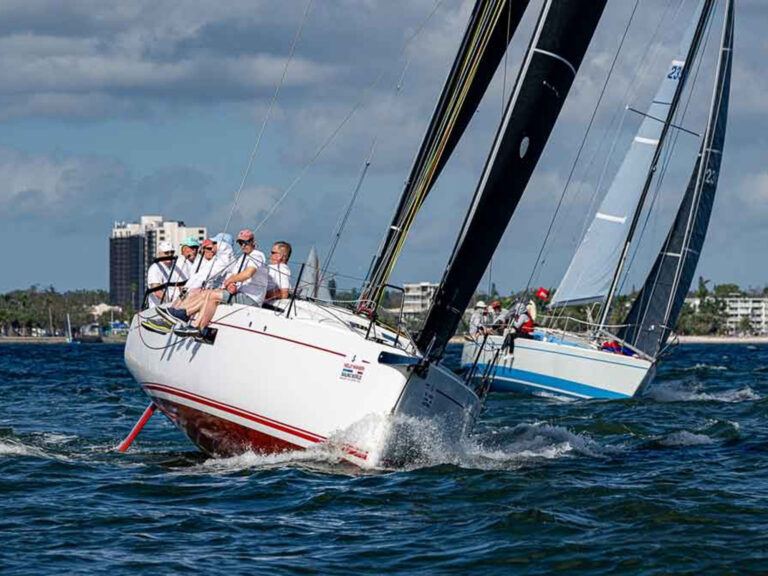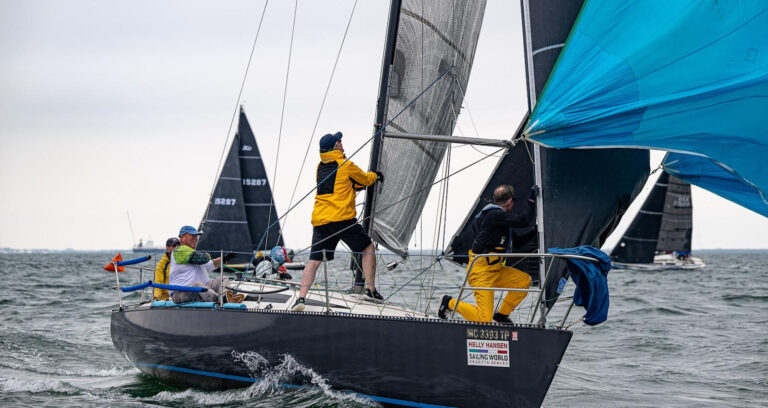
Isabelle Kinsolving and Erin Maxwell
Now 30, Isabelle Kinsolving Farrar is an Olympian (2004), a world champion (2008), a wife, an Ivy League graduate (Yale ’02), and will soon be a lawyer. Yet she still spends many weekends and most her vacation time sailing a 15-foot dinghy in pursuit of an Olympic gold medal. Farrar and skipper Erin Maxwell finished 11th at the 2010 Women’s 470 World Championships in The Hague, Netherlands, last July. There were the top American team, but 2008 Olympians Amanda Clark and Sarah Chin were right on their heels in 12th.
SW: You finished 11th place at the Worlds, which follows a 10th place last year and, of course, your world championship in 2008. Tell me a little bit about that result and where it stands relative to your expectations for your campaign?
IKF: We were really pleased with our 11th place finish at the Worlds. Of course, every competitor always wishes that they had finished higher, but Erin and I realize that our goal is a gold medal at the Olympics, which is two years from now. And right now, we’re just doing enough training and racing to keep pace with our competition so that when we’re able to spend more time on the water, we’ll be able to step it up. That 11th place met those goals.
In terms of those results, we were winning after the first day and in third after the second and third days. That was just tremendous. After being at the top, an 11th place feels disappointing, but at the same time, we were using a new sail design that we’d literally sailed with for maybe seven days before the world championship. So, we were taking a risk, but one that was moving us toward our goal of a gold in 2012. We were really happy with how that gamble paid off in light winds. In strong winds, we just didn’t have the sail up to speed quite yet, and it showed.
SS: In the 470, so much time is spent on sail design and mast tuning and matching the main and the rig. What’s the toughest part of getting a new design or a new sail up to speed?
**IKF: **What’s most difficult about getting a new design up to speed is the inherent gamble of sailing and weather and wind conditions. Even if you really want to tune the sail in over 15 knots or over 20 knots, you’ve got to have those conditions to experiment. I’d say that’s the biggest challenge is just finding the conditions: being in the right place at the right time. And also, when you have the conditions, having a good reference, because unless you have someone that you know is fast to go sailing with, going sailing by yourself isn’t going to do you a whole lot of good in terms of getting that last five or ten percent. You can get three-quarters of the way there maybe by yourself, but three-quarters is not good enough.
**
**
SS: You are now how old, Isabelle?
IKF: That’s classified! No, Erin’s 31, and I’m 30.
SS: OK, now you’re 30. You’re an Olympian, World Champion, married, you’re going to be a lawyer in less than a year. What’s keeping you sailing?
IKF: Just the love of competition and love of sailing. I realize that competing at the highest level in an Olympic class boat is not something that I’ll probably be ever able to do again. It’s such a privilege. Definitely, that’s what keeps me going. And also having an excellent teammate and a supportive husband.
SS: What’s the plan for next year? You’re full on with law school, and you’re planning to finish on schedule, but that will leave you precious little time before the start of your trials.
IKF: We’re planning on sailing more regattas next spring. The great thing about law school is I get to pick which classes I take and design my schedule carefully.
SS: I don’t imagine there are too many easy classes in law school.
IKF: There aren’t easy classes, but I can condense my classes so that I only have class two or three days a week so that I can facilitate training the rest of the time. Living in New York makes commuting to training and regattas very easy, relatively speaking.
SS: The Olympic trials for you start next January, right? You’re not going to struggle to qualify for the spot, but come January, you’re sailing for your spot in the Sail for Gold, is that right?
IKF: I’m not really sure how the Sail for Gold qualifying system works, but I’m confident that we’ll qualify.
SS: But you will be essentially sailing at these other events you’ve got to start doing.
IKF: We’ve done the Rolex Miami Olympic Classes Regatta. We’ll do our best to juggle work, school and sailing, but with a greater emphasis on sailing.
SS: Did winning the World Championship in January 2008 change anything about your position in the fleet? Being a world champion, are there any fringe benefits that come along with it, aside from the trophy you take home?
IKF: Every competitor immensely respects any other competitor that has been able to win a major championship, be it Worlds, Europeans, Olympics. You do get more respect from your competitors. I think that makes a difference, especially in scenarios where boats might foul or might not foul. We’ve found that, generally speaking, at the top of the fleet, when there’s an incident, someone will spin, if there was actually an incident. At the same time, we’re definitely among some of the older competitors in the women’s 470 fleet, so there are a lot of young teams that, we feel, have no idea who we are. I don’t know if that’s right or wrong. So you get respect from the people you’ve competed against, which is always nice. It also makes training a whole lot easier. People are much more likely to want to train with us and let us join their training, which makes our time on the water more productive.
SS: One big roadblock to getting to that gold medal is the other US women’s 470 team, which was right behind you in the last world championship by just a few points. What’s your relationship with Sarah and Amanda?
IKF: Sarah and Amanda are really nice people. I’m friends with them off the water and respect their sailing tremendously and what they’ve accomplished. At the same time, it’s no secret that only one of us can go to the Olympics. All four of us, we’re all married, we all have lives off the water. I think, for that reason, we all understand the amount of sacrifice that each person is making to be on the water and respect each other for that.
SS: But on the water it doesn’t sound like there’s any kind of cooperation among you guys.
IKF: Our schedules make it extremely difficult to cooperate. At regattas, we do tune up together before racing and certainly don’t race against each other, necessarily. We’re racing against the fleet and not against each other. Erin and I train almost exclusively on the weekends and we do a lot of domestic training in Connecticut. Because Erin lives in Connecticut, and I live in New York, it’s really easy for us to do that. Amanda and Sarah sail almost exclusively during the week and mostly over in Europe. On the weekends, they spend time with their husbands and try to have normal weekends. So, we haven’t been training together, but for no other reason than, logistically, it’s almost impossible. I understand that they want weekends off, but we can’t take weekends off. I wish we could do more training together.
SS: Any idea what you want to do after you finish law school and this campaign ends?
IKF: Be a lawyer. Right now, I’ve been splitting time between the litigation and tax departments at the law firm. I’ve enjoyed all that. I’ve also enjoyed doing a lot of pro bono work. So, I hope to continue all of that work. But, primarily move up to Boston. That’s my number one goal, professionally.
SS: What about sailing after you’re done? Will you be able to sail and enjoy it?
IKF: Definitely. Jonathan Farrar, my husband, just got an F-18 catamaran with Bob Merrick, so Jonathan and I are really looking forward to racing that after I’m done with 470 sailing. And I’ll be doing some cross training in the F-18 while I’m campaigning. And my dad has a 36-foot wooden sailboat based on Fisher’s Island, and I’m really excited to cruise it around New England. And, if we move up to Boston, I get to go Tech sailing on Tuesday nights during the summer. So there’s all sorts of stuff I’m really excited to do.

